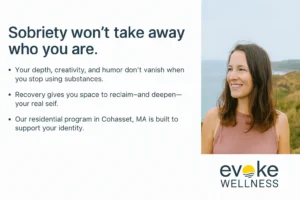Even if you’ve made peace with the idea that you might need help, there can still be one question that sticks in your throat: What if sobriety takes away who I am?
If you’re creative, charismatic, or someone who’s used substances to feel emotionally connected or socially open, this fear can feel especially heavy. Because it’s not just about quitting—it’s about not disappearing in the process.
At Evoke Wellness in Cohasset, our residential treatment program is built to help people preserve who they are—not erase it. And if you’re afraid that healing means giving up the spark inside you, you’re not alone. Let’s talk about why that fear is valid—and why it doesn’t have to come true.
The Myth of the “Sober Shell”
For many, the idea of getting sober conjures images of becoming flat, boring, or robotic. It’s not that people love being out of control. It’s that they’ve tied their liveliness to substances.
“I don’t want to become one of those people who’s always ‘fine,’” one client told us. “I don’t want to lose the color.”
And they’re right to want to protect that color. Because it is real.
But here’s the truth: sobriety doesn’t flatten you. It filters out the noise so that your real voice—your real edge, your depth, your sense of humor—can stand on its own.
What You Use Isn’t All You Are
Substances are powerful. They can feel like a shortcut to vulnerability, confidence, expression. They’ve often been a tool for survival, or even connection.
So the fear that getting sober will erase those things isn’t irrational. It’s deeply human.
But healing doesn’t require pretending you never needed those tools. It means learning how to access the same parts of you—connection, courage, creativity—without substances acting as the gatekeeper.
In treatment, you get to ask big questions:
- What does it feel like to be fully me, without numbing?
- How do I reconnect with emotion… without losing control?
- What if I’m actually more interesting than I thought?
Rediscovering Identity in Residential Treatment
Residential treatment gives you time and space to ask—and answer—those questions safely.
At Evoke Wellness at Cohasset, we often hear people say things like:
- “I’m realizing I used to write before I used.”
- “I thought my confidence came from drinking. But it was always in me—I just didn’t know how to access it without a buzz.”
- “It’s not about finding a new me. It’s about getting back to who I was before everything got loud.”
That’s the work of recovery: not inventing someone new. Reclaiming someone real.
You’re Not “Too Unique” for This
If you’ve ever felt like traditional treatment wasn’t made for someone like you—someone creative, fluid, resistant to black-and-white definitions—you’re not alone.
The idea that recovery only works if you follow someone else’s blueprint can be stifling. Especially if your identity is shaped by curiosity, self-expression, or a need to not be boxed in.
That’s why our residential treatment program doesn’t rely on rigid roles or “one-size-fits-all” narratives. We use:
- Individual and group therapy that invites reflection without judgment
- Trauma-informed care that honors your lived experience
- Clinician support that helps you explore, not just conform
You don’t have to become someone else to get better. You just have to be willing to meet yourself more fully.
The Role of Structure (and Why It’s Not the Enemy)
Structure can feel threatening when you’re afraid of losing autonomy. But in treatment, structure isn’t about control—it’s about containment.
Think of it like scaffolding during a renovation. You’re still the architect. But you’ve got something to hold you up while you rebuild.
In residential care, structure creates:
- Safe, predictable rhythms (so your nervous system can settle)
- Boundaries that protect—not suffocate—your creativity
- Room to experiment with who you are, without constant emotional whiplash
It’s not about becoming someone different. It’s about finally having the space to become yourself, on purpose.
Creativity Doesn’t Die in Recovery—It Deepens
Here’s something we’ve seen over and over: creativity doesn’t vanish when you stop using. If anything, it amplifies.
Why? Because the emotional bandwidth you were using to manage highs, crashes, and chaos gets freed up. And when it does, things come alive again.
We’ve watched clients:
- Start painting for the first time since college
- Reconnect with songwriting after years of silence
- Realize their humor still hits without being drunk
One client even told us, “For the first time in years, I’m writing stuff I don’t want to throw away.”
That’s the gift of clear-headedness—it doesn’t numb the world. It lets you participate in it more fully.
Healing in a Place That Honors Your Whole Self
Our residential program in Cohasset isn’t about fixing you. It’s about supporting you as you untangle what’s yours, what’s performative, and what’s been survival.
Cohasset itself offers a quiet setting that helps this work unfold gently. Tucked into the Massachusetts coastline, it’s not loud or flashy—but it gives you room to hear yourself think. To reconnect with your body. To build a version of recovery that reflects your actual needs—not just what you think you’re supposed to want.
You’re not here to become “the sober one.” You’re here to become someone who can live fully—without being afraid of disappearing.
What Happens After Treatment?
We don’t just help you through the early days. We help you plan for the ones after.
That might include:
- Continuing therapy to deepen identity work
- Exploring creative communities outside of substances
- Building routines that protect your emotional energy
Recovery isn’t a finish line. It’s a foundation. And your identity—your real, whole self—is part of what makes it sustainable.
FAQs: Preserving Identity in Residential Treatment
Will I lose my personality in treatment?
No. In fact, many people reclaim parts of their personality they thought were gone. You may find that you’re funnier, more insightful, or more emotionally connected than you realized—because you’re finally not filtering everything through a substance.
What if my creativity depends on being high or buzzed?
It can feel that way—but that’s usually because substances have become a shortcut to emotional openness. In treatment, you’ll learn how to access that vulnerability on your own. It takes practice, but the results are more sustainable—and often more powerful.
I don’t fit the mold of a typical “addict.” Will treatment still help me?
Yes. You don’t have to meet anyone’s definition of addiction to benefit from support. If substances are getting in the way of how you want to live, treatment can help—even if your story doesn’t match the stereotype.
Is residential treatment too structured for someone like me?
Structure doesn’t mean rigidity. It means support. Our program is built to support individuality—not suppress it. You’ll have routines that ground you, and space to grow within them.
Can I still explore who I am while in treatment?
Absolutely. In fact, that’s one of the core goals. Treatment is a space where you get to take off the masks—without being judged—and find out who you actually are underneath.
Still you. Just clearer.
Call 866-931-6429 or visit our Residential Treatment services in Cohasset, MA to explore how healing can restore who you are—not take it away.





